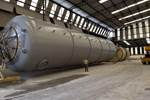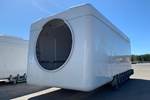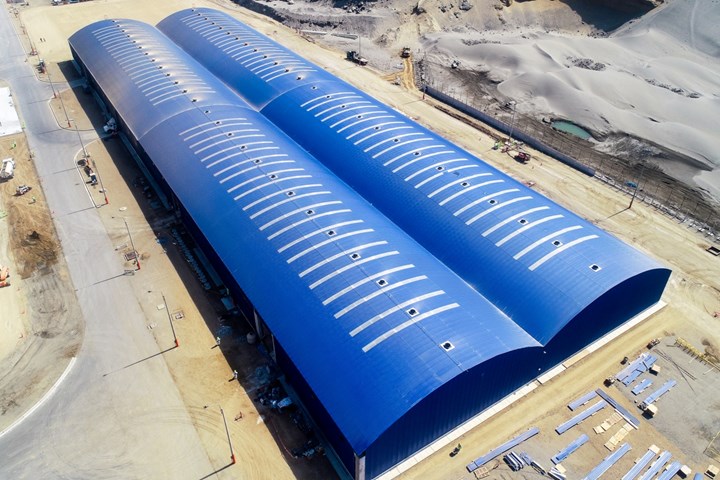Planefibra develops opaque composite roof tiles for corrosive environments
Brazilian company targets industrial applications with tiles featuring an estimate useful life of 10 years, five times longer than galvalume steel and fiber cement.
Share
Planefibra opaque tiles installed in a logistics warehouse on the coast of Peru. Photo Credit: Planefibra
Planefibra (Santa Catarina, Brazil), a company specializing in solutions for lighting and ventilation, has taken advantage of composites — their robustness, light weight and even their ability to be formulated with resins resistant to flame propagation — and invested in the production of opaque composite tiles for corrosive environments.
According to estimates by Canadian scientists, corrosion was responsible for worldwide losses of $2.5 trillion in 2021. In addition to marine corrosion, many industrial operations emit gases that end up damaging various types of metallic structures. In relation to tiles, however, Planefibra says fiberglass composites pose a solution that not only solves the problem of corrosion, but offers additional advantages, such as better control of room temperature.
“Although they are used abroad in very sophisticated applications, such as parts for space shuttles, trains and luxury vehicles, in Brazil composite materials are associated with products of dubious quality,” Cyrus Muchalski, general manager of Planefibra, says. “However, if manufactured according to technical standards, they offer much more benefits than metal or wood, and this is clearly the case with tiles.
“One of the main characteristics of composites is corrosion resistance, so much so that boat hulls and chemical tanks are made with this combination of polymers and fibers,” Muchalski continues. “So, we decided to include all this differential in a product that we already manufactured, but until then with a focus only on coverage associated with the gain in luminosity.”
After a series of tests carried out in the Planefibra laboratory and in the field, some with the participation of the Laboratory of Energy Efficiency in Buildings (LabLEE), of the Federal University of Santa Catarina (USFC, Brazil), the company started to manufacture opaque roof tiles for industrial applications, such as fertilizer factories, warehouses that store chemical products and port facilities.
“Our direct competitors are galvalume steel and fiber cement tiles. In addition to being able to develop much lighter products, in the color and to the extent that the customer wants, composite tiles have a useful life up to five times longer, which gives much more security not only to construction companies, but also to shed operators,” Muchalski contends.
A fertilizer manufacturer, Yara Brasil (Porto Alegre, Brazil) was the first customer for Planefibra’s opaque tiles — the company installed 9,877 square meters of the product in its sheds, replacing fiber cement tiles. “Next, we supply the Port Terminal of Salaverry, in Peru,” Muchalski says.
Planefibra’s opaque tiles have also been installed in farms and pigsties across Brazil — the gases produced by the animals’ feces are said to require frequent replacement of metal tiles. “Our products have a five-year factory warranty and an estimated useful life of 10 years, numbers that prove the cost-benefit ratio,” Muchalski concludes.
Related Content
-
Composites-reinforced concrete for sustainable data center construction
Metromont’s C-GRID-reinforced insulated precast concrete’s high strength, durability, light weight and ease of installation improve data center performance, construction time and sustainability.
-
CirculinQ: Glass fiber, recycled plastic turn paving into climate solutions
Durable, modular paving system from recycled composite filters, collects, infiltrates stormwater to reduce flooding and recharge local aquifers.
-
Fiberglass conduit manufacturer grows into new products, infrastructure applications
Texas-based Champion Fiberglass, a five-time CW Top Shops honoree, expands its success in the fiberglass composite conduit market into new applications and products, looking toward future automation and sustainability initiatives.

















